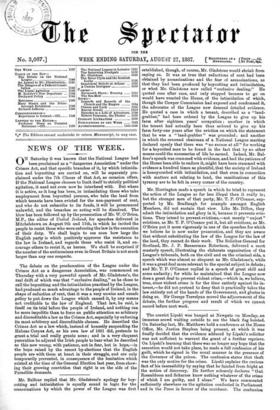Mr. Harrington made a speech in which he tried to
represent the action of the League as far less illegal than it really is; but the stronger men of that party, Mr. T. P. O'Connor, sup- ported by Mr. Bradlaugh for example amongst English Members, did not sustain that view. Like Mr. Dillon, they admit the intimidation and glory in it, because it prevents evic- tions. They intend to prevent evictions,—not merely " unjust" evictions, as Mr. T. P. O'Connor put it, but all evictions, as Mr. O'Brien put it more vigorously in one of the speeches for which we believe he is now under prosecution, and they are aware that without substituting the law of the League for the law of the land, they cannot do their work. The Solicitor-General for Scotland, Mr. J. P. Bannerman Robertson, delivered a most masterly speech, illnetrating the elaborate organisation of the League's tribunals, both on the civil and on the criminal side, a speech which was almost as eloquent as Mr. Gladstone's, while it was a great deal more relevant to the special subject in debate; and Mr. T. P. O'Connor replied in a speech of great skill and some audacity; for while he maintained that the League now does a great deal to prevent violent crime,—which is, we believe, true, since violent crime is for the time entirely agaiust its in- terest,—he did not pretend to deny that it practically takes the law entirely out of the hands of the Government, and glories in doing so. Sir George Trevelyan moved the adjournment of the debate, the further progress and result of which we cannot record before next week.


































